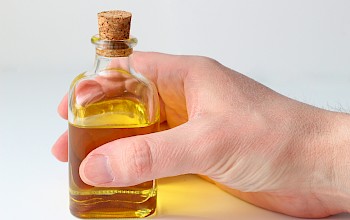Cottage Cheese: Calories and Nutrition Analyse
How many calories in cottage cheese?

Nutrition Facts
Cottage CheeseServing size:
one package (200 g) change
5g10g15g20g30g40g50g60g80g100g120g140g160g180g200g220g250g300g350g400g450g500g600g700g800g900g1000g
1oz2oz3oz4oz5oz6oz7oz8oz10oz12oz15oz20oz25oz30oz35oz40oz50oz
Amount Per Serving:
100g of cottage cheese contain about 98 calories (kcal).
Calories per:
ounce
| one cottage cheese
| tablespoon
| teaspoon
| cup
| half cup
To illustrate, a one package (200 g) cottage cheese contain about 196 calories.
This is about 10% of the daily caloric intake for an average adult with medium weight and activity level (assuming a 2000 kcal daily intake).
Scroll down for details and nutrition tables.
To visualize how much 196 kcal actually is, keep in mind that the calorie content of one package cottage cheese is similar to that of, for example:
- 3.5 apples
- 2.5 glasses of Coca Cola (220 ml glass)
- 1.5 slices of bread
- 1.5 glasses of milk
- 10 cubes of sugar
Take a quick look at the tables below for detailed information about cottage cheese nutrition.
100g of Cottage Cheese
Nutrition
- Calories98
- Carbs Total3.38 g
- Dietary fiber0 g
- Fat4.3 g
- Protein11.12 g
- Water79.79 g
Vitamins
- Vit A140 IU
- Vit B1 (Thiamine)0.027 mg
- Vit B2 (riboflavin)0.163 mg
- Vit B3 (Niacin)0.099 mg
- Vit B60.046 mg
- Vit B9 (Folic acid)0.012 mcg
- Vit E0.08 mg
Minerals
- Potassium104 mg
- Phosphorus0.1 mg
- Magnessium8 mg
- Calcium83 mg
- Sodium315 mg
- Iron0.07 mg
- Zink0.1 mg
Discover the Nutritional Powerhouse: Cottage Cheese
When it comes to versatile dairy products that pack a nutritional punch, cottage cheese often flies under the radar. Yet, this humble cheese is not only delicious but also brimming with health benefits. Whether you're looking to build muscle, lose weight, or simply eat healthier, understanding the cottage cheese calories, cottage cheese nutrition, and its macronutrient profile can help you incorporate it into your diet effectively.
Calories and Macronutrients
One of the most appealing aspects of cottage cheese is its calorie count. With only 98 calories per 100 grams, it's a low-calorie option that doesn't skimp on nutrients. This makes it an excellent choice for those monitoring their calorie intake.
But what about the macros? Here's a quick breakdown:
- Protein: At 11.12 grams per 100 grams, cottage cheese is a protein powerhouse. This makes it a favorite among athletes and fitness enthusiasts for muscle repair and growth.
- Fat: It contains 4.3 grams of fat per 100 grams, with a portion of that being healthy fats. This moderate fat content contributes to satiety, helping you feel full longer.
- Carbs: Cottage cheese is low in carbohydrates, with only 3.38 grams per 100 grams. Plus, it contains 2.67 grams of sugar and zero fiber, making it suitable for low-carb diets.
Nutritional Benefits Beyond Macros
Aside from its macronutrient profile, cottage cheese is rich in essential vitamins and minerals. It's a good source of calcium (83 mg per 100 grams), which is crucial for bone health. It also provides a modest amount of potassium (104 mg), sodium (315 mg), and magnesium (8 mg), which are important for heart health, muscle function, and more.
Moreover, cottage cheese contains vitamins such as vitamin A (140 IU), vitamin B2 (0.163 mg), and vitamin B3 (0.099 mg), which support vision, skin health, and energy production, respectively.
Incorporating Cottage Cheese into Your Diet
Given its nutritional profile, cottage cheese can be a valuable addition to any diet. Here are a few ideas to get you started:
- Breakfast: Mix it with fruits and a drizzle of honey for a protein-packed breakfast.
- Snacks: Use it as a dip for veggies or whole-grain crackers.
- Main meals: Add it to salads, spread it on toast, or incorporate it into sauces for a creamy texture.
With its low cottage cheese calories, high protein in cottage cheese, moderate fat in cottage cheese, and low carbs in cottage cheese, this dairy product is not only nutritious but also incredibly versatile. Whether you're looking to enhance your diet or find new, healthy ingredients to experiment with, cottage cheese is worth considering.
Remember, incorporating a variety of nutrient-dense foods into your diet is key to achieving and maintaining overall health. Cottage cheese, with its rich nutritional profile, is an excellent choice for those seeking to eat well and live a balanced lifestyle.
How many calories are there in 1, 2, 3, or 5 servings of cottage cheese?
- One package (200 g)196 kcal
- Tablespoon of cottage cheese (14g)14 kcal
- Teaspoon of cottage cheese (5g)5 kcal
- Cup of cottage cheese (226g)221 kcal
- Half cup of cottage cheese (113g)111 kcal
- Ounce (oz) of cottage cheese28 kcal
Compare cottage cheese:
cottage cheese vs feta cheese, cottage cheese vs boiled egg, cottage cheese vs mozzarella, cottage cheese vs kefir, cottage cheese vs sour cream, cottage cheese vs mascarpone, cottage cheese vs cheddar, cottage cheese vs egg yolk, cottage cheese vs egg white, cottage cheese vs Greek yoghurt, cottage cheese vs plain yogurt, cottage cheese vs ricotta cheese, see all compares of cottage cheese.

Similar calories number have:
See also:
Read this:
- How many calories does long island iced tea have?
- Calories in a half of McDonalds Sundae Caramel
- Calories in whole McDonalds Sundae Caramel
- Calories for one, two or more McDonalds Sundae Caramel
- How many carbs (carbohydrates) in risotto?
- How much fat in peanut butter cookie?
- How much protein in salmon salad?
- What is weight of ginger beer?
- Pinot Blanc calories per ounce (oz)
- Beef pot pie calories per serving size



Add comment